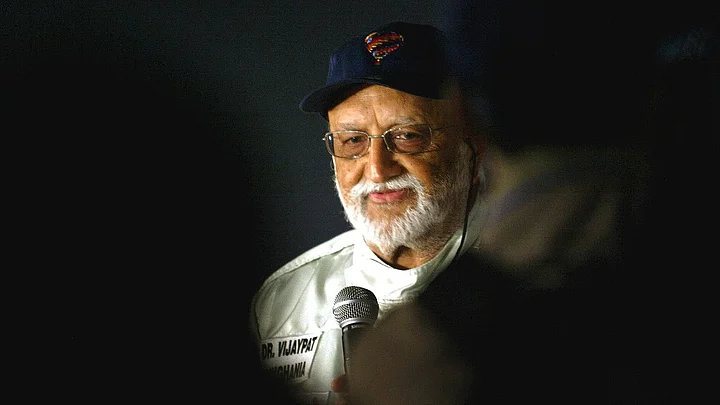In a rare occurrence, the Supreme Court held a special session on Sunday, 30 April, to hear an over 30-year-long property dispute of the Singhania group, related to the ownership of their family bungalow in Juhu, Mumbai.
The session was headed by a two-judge bench of Justices Dipak Misra and AM Khanwilkar. Other senior advocates involved in the matter include Kapil Sibal, P Chidambaram, Shyam Divan, etc, appearing for different parties.
So here’s what we know about the high-profile case that brought the apex court to session on a Sunday.
Who Are the Singhanias?
The Singhania clan head a group of industries under JK Organisation, founded in the 1920s by Lala Juggilal Singhania and his son Kamlapat Singhania, who first set up JK Cotton Spinning and Weaving Mills in Kanpur.
An Indian Express report said that the business was soon diversified into jute, sugar, iron and steel, etc., which was further expanded by Kamlapat’s three sons; Padampat, Kailashpat and Lakshmipat.
There are currently three branches of the family in Kanpur, Mumbai and Kolkata headed by patriarchs Gaur Hari Singhania, Vijaypat Singhania and Hari Shankar Singhania respectively.
In Mumbai, Vijaypat and his son Gautam run the textile brand Raymond Group. The Kolkata branch runs JK Tyre, JK Papers, etc, whereas the Kanpur kin heads JK Cement Ltd, JK Cotton Ltd among others.
What Is the Property Dispute About?
The three branches set up a partnership firm called Juggilal Kamlapat Bankers (JK Bankers) in 1969.
A Mumbai Mirror report said that it was reconstituted in 1980, dividing the share of losses and profits equally between the three.
The report listed properties under JK Bankers, including a bungalow in Juhu, Mumbai and several other properties in Kanpur, which are under the possession of Gaur Hari Singhania.
The firm was dissolved in 1987 and a Deed of Dissolution was signed by the three parties agreeing on distribution of immovable assets free from encumbrances.
The deal was to be completed by May 1987, but the three could not reach an agreement.
Retired SC judge Justice SN Varianva was appointed as the arbitrator in April 2006, who directed the division of the properties and awarded the Juhu bungalow to the Kolkata branch. Some of the Kanpur properties were awarded to Mumbai.
The partition was done after a valuation report was submitted by HDFC Ltd, which said the total cost of all properties in March 2008 was Rs 130 crore and the Juhu bungalow alone was worth Rs 89.66 crore.
To equalise the share between the three, the Kolkata branch was asked to pay around Rs 23 crore each to the other two so that the amount awarded to all would stand at around Rs 43 crore.
Not Satisfied With the Arbitral Award
With Kolkata being handed a mammoth share, Mumbai cried foul, saying the Juhu bungalow was “overvalued” and that they “were not given the opportunity to cross-examine the valuer”, said Mumbai Mirror. Whereas Kanpur wanted to retain all properties.
‘Litigation Dragged On for 30 Years’
In April 2013, the Bombay High Court directed the family to follow the arbitrary (arbitrator’s) orders issued in 2008.
According to a Times of India report, the Bombay HC again in May 2016 ordered Vijaypat Singhania to vacate the Juhu property and slammed both Mumbai and Kanpur for “dragging the litigation on for 30 years”.
Using their money power, the Kanpur Group and Bombay Group (all are leading industrialists) have for their selfish motives and greed only dragged on the litigation and consumed precious judicial time of this court and also of the Apex Court.Bombay HC Order
In March 2017, the appeal by Vijaypat and son Gautam against the Bombay HC order directing them to execute the arbitral award was dismissed by the Supreme Court.
The order passed by the SC on 30 April directed petitioner Gautam Singhania to hand over the Juhu bungalow to Hari Shankar Singhania (respondent) who is required to deposit Rs 20 crore to the Registry of the Supreme Court before or on 4 May 2017.
The order further stated:
In the event the amount is deposited, the Advocate-on-Record for the respondents shall intimate it to the Advocate-on-Record for the petitioner. The purpose of this intimation is that the petitioner shall hand over the possession of the property as mentioned herein-above on or before 6th May, 2017, which is not later than forty-eight hours. When we say the petitioner, it means that the possession of the property shall be handed over and anyone who tries to create obstruction, shall be liable for contempt of this Court
The next hearing is on 8 May.
